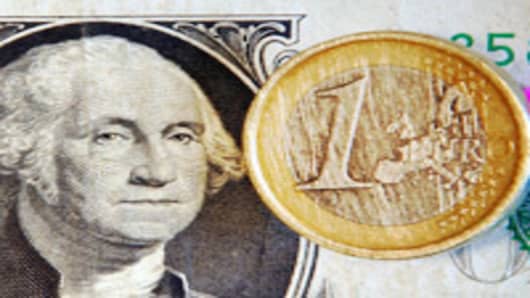The U.S. dollar rebounded against the euro on Monday as traders bought back the U.S. currency as the second quarter ends, but losses in the euro may be limited ahead of an expected rate hike by the ECB this week.
"As the quarter comes to an end, we are seeing some investors adjusting their portfolios, buying back some dollars and selling euros," said Greg Salvaggio, a currency trader at Tempus Consulting in Washington.
"But selling in the euro may stall ahead of the ECB meeting. They are going to raise rates and possibly indicate further hikes," he added.
The euro has benefited recently from widespread expectations that the European Central Bank will raise rates to 4.25 percent on Thursday to fight inflation.
Euro-zone consumer prices jumped to a record high of 4.0 percent year-on-year in June, more than double the ECB's 2 percent target, according to data released on Monday.
Analysts said the data would go further harden the euro area central bank's resolve to hike interest rates when it meets this week, with some seeing risks increasing for a post-July tightening as well.
"The ECB fears that deteriorating inflation expectations might induce higher-than-expected wage claims, triggering a wage inflation spiral. As these pressures are likely to edge higher in the near term, risks of the ECB going beyond the expected July hike are mounting," said Clemente de Lucia, an economist at BNP Paribas in Brussels.
The euro was lower against the dollar after earlier hitting a three-week high of $1.5836.
The dollar earlier hit a month-low 72.041 versus a trade-weighted basket of six major currencies. The index last traded 0.1 percent higher at 72.381.
The dollar earlier hit a month-low versus a trade-weighted basket of six major currencies at 72.041, but rebounded to trade last 0.3. percent higher at 72.530.
The greenback had little reaction to a report showing business activity in the U.S. Midwest contracted in June for a fifth straight month, but at a less severe rate than expected.
"The currency reaction has been modest. Even though it's stronger than expected, it doesn't really rank up there as a highlight this week, given that we get a nationwide manufacturing gauge from the ISM tomorrow and then the ECB decision and U.S. payrolls later in the week," said Nick Bennenbroek, head of FX strategy at Wells Fargo Bank in New York.
The closely watched U.S. employment report is expected a day earlier than usual on Thursday, along with the ECB meeting. On Friday U.S. markets will be closed for the Independence Day holiday.
"Payrolls (data) has the greatest potential for surprise, and we think the risks are weighted toward disappointment," Bennenbroek added. "So even after what was a big drop for the dollar last week, there is probably still room for it to fall further."
The greenback also rebounded from earlier lows against the the Japanese yen as U.S. stocks advanced. It last traded 0.1 percent higher against the yen at 106.18 yen.
The dollar was on track to gain more than 6 percent versus the yen this quarter. The euro was little changed against the dollar in the quarter, after rising about 8 percent in the first quarter.
U.S. Treasury Secretary Henry Paulson said on Monday in Moscow he believes in a strong U.S. dollar and that U.S. officials were working to resolve the country's economic problems.


